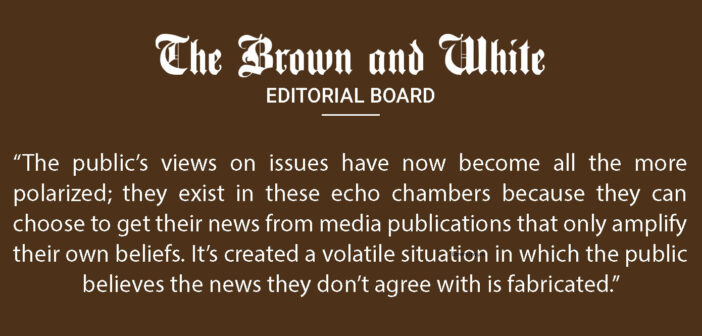When you ask a journalist what it means to be a good reporter, their response will usually be some regurgitation of the SPJ Code of Ethics.
To seek truth and report it fairly and accurately, to be transparent or to minimize harm.
In reality, what it all boils down to is the ability to remain objective in reporting— to tell a story as it is, with no underlying biases or motive to frame public opinion.
But how often is that goal achieved? And even more so, is it even possible to achieve?
After all, outside of their profession, journalists are people with many opinions to share.
After the Fairness Doctrine, that required radio and television broadcasters to report news by covering both opposing sides to a story, was repealed in 1987 by the Federal Communications Commission, reporting no longer had to be impartial.
News is essential to keeping the public informed, but with so many platforms, public opinion on what is going on in the world is entirely cultivated by where one chose to get their news.
Today, there is an evident divide between the ideologies of different media companies. The same event being reported on Fox News typically looks much different than it does on CNN. The consequences of this are widespread and perpetuate the distrust of mainstream media.
The public’s views on issues have now become all the more polarized; they exist in these echo chambers because they can choose to get their news from media publications that only amplify their own beliefs. It’s created a volatile situation in which the public believes the news they don’t agree with is fabricated.
At The Brown and White we strive to eliminate bias through a holistic reporting process.
We ask each reporter to identify all stakeholders in their story assignments before they begin reporting.
However, many major news outlets fall short on doing this— only speaking to sources that will help frame the story in the way they want it to be perceived by the public.
Despite our efforts to ensure proper coverage, we still find that many important voices get left out of the stories we publish and that some of these stories do not reflect the full array of perspectives that exist.
Our inability to remain objective shouldn’t be because of lack of effort to tell the full story.
In order to improve the quality of the articles we produce, we must hold ourselves and our staff to a heightened expectation of following journalistic principles.
This starts by seeking out the more challenging sources.
When we write stories about the South Bethlehem community, reporters often look to interview Lehigh students and faculty first out of convenience. As a result, we forgo the community voices that matter.
We need to start being more conscientious about the way we approach talking to our sources. We’ve run into situations where reporters incorrectly identify sources or make them feel as though they have been asked to be a source on a particular story, simply because they fit the story’s angle just right.
Something as simple as taking the time to speak with sources before beginning an interview, and giving them the opportunity to identify themselves, can go a long way in both conveying the source’s truth and making the source feel valued in the reporting process.
Even though our reader base does not compare to that of The New York Times, misrepresentation in our stories still has a damaging effect.
Our communities pay attention and it is important that we keep this in mind as we share their stories.
We are not here to only represent those within our university’s walls, we are here to also amplify voices outside those walls.
We have an overall duty to purvey the truth to the public, and in order to do this, we must start with going beyond the minimum standards we have set.






Comment policy
Comments posted to The Brown and White website are reviewed by a moderator before being approved. Incendiary speech or harassing language, including comments targeted at individuals, may be deemed unacceptable and not published. Spam and other soliciting will also be declined.
The Brown and White also reserves the right to not publish entirely anonymous comments.